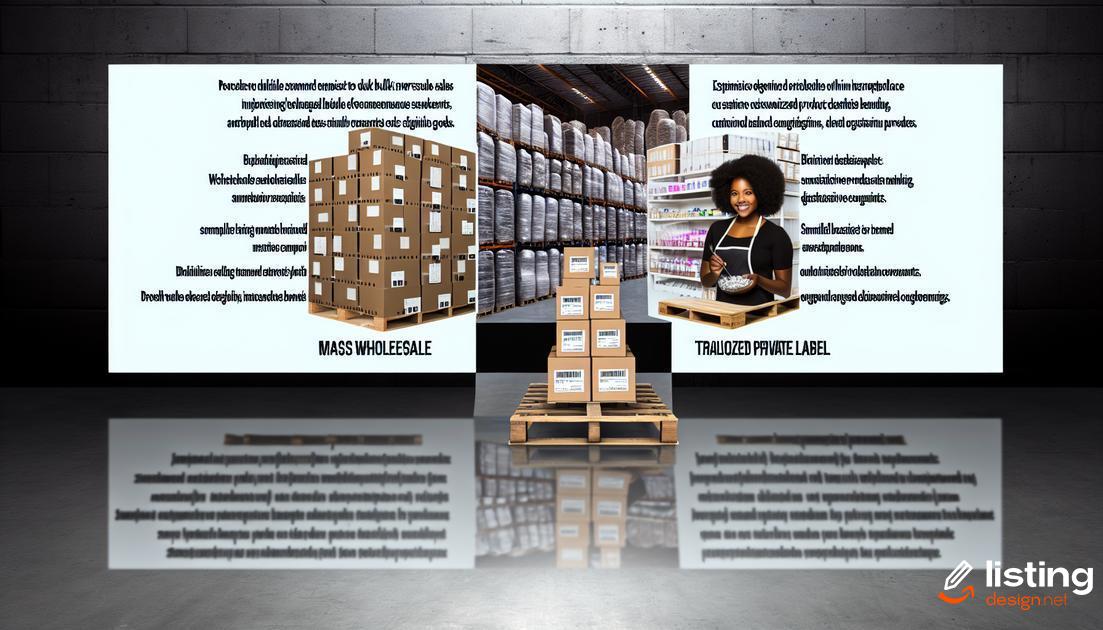Amazon FBA Wholesale vs Private Label are two popular methods for selling on Amazon. Choosing the right approach can significantly impact your business’s success. In this post, we will delve into the key differences, benefits, and challenges of each model. This guide is designed to help you make an informed decision, whether you are new to Amazon FBA or looking to switch your strategy.
Table of Contents
Understanding Amazon FBA
Amazon FBA, or Fulfillment by Amazon, is a service offered by Amazon that provides storage, packaging, and shipping assistance for sellers. By utilizing Amazon’s extensive logistics network, sellers can reach more customers and ensure their products are delivered efficiently and professionally.
Amazon’s Logistics Network:
Amazon’s expansive logistics network gives sellers the opportunity to leverage professional storage solutions, streamlined packaging, and fast shipping services, which can greatly enhance the customer experience.
Inventory Management: FBA simplifies inventory management by offering warehousing solutions, so sellers don’t have to handle stock directly. This allows for better focus on other aspects of the business, like marketing and customer service.
It is essential to understand that FBA involves fees for storage and fulfillment services. These costs can vary based on the size and weight of the products, as well as the duration they are stored in Amazon warehouses.
The service also includes customer service management, meaning Amazon handles returns and inquiries on behalf of the seller. This can save significant time and resources, allowing sellers to scale their businesses efficiently.
Eligibility and Restrictions:
Not all products are eligible for FBA. Sellers must ensure their products comply with Amazon’s guidelines and restrictions, which cover product types, condition of items, and packaging requirements.
Overall, FBA offers a robust framework for both burgeoning and established sellers to optimize their order fulfillment processes, manage inventory more effectively, and reach a larger audience. This can be particularly beneficial when navigating between wholesale and private label models within the Amazon marketplace.
What is Wholesale in FBA?
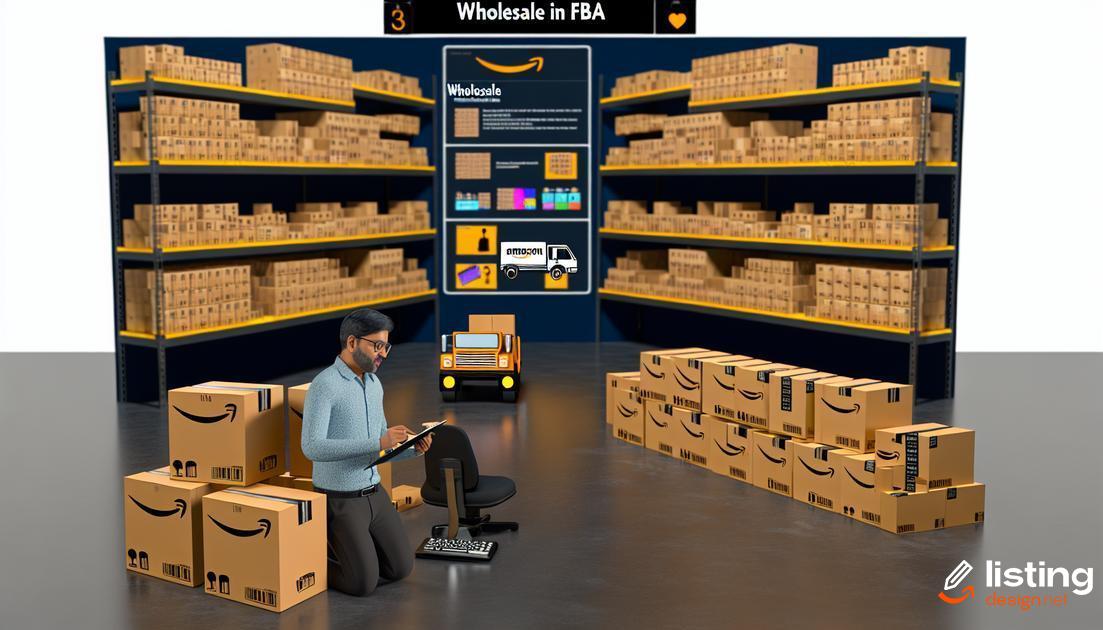
In the context of Amazon FBA (Fulfillment by Amazon), wholesale involves buying products in bulk directly from manufacturers or distributors at a lower price and then reselling these products on Amazon at a markup. This model capitalizes on the existing brand reputation and product demand.
Wholesale sellers work with established brands, requiring them to secure contracts and purchase large quantities to benefit from the economies of scale. The goal is to leverage volume purchases to achieve significant profits.
Unlike private labeling, where you create your own brand, wholesale is about reselling other brands’ products. This means you don’t have to worry about the manufacturing process, product development, or brand building. However, it does require extensive research to find trustworthy suppliers and to ensure there is a sustainable demand for the products you choose to sell.
Choosing the wholesale model for FBA can be especially advantageous due to Amazon’s logistics network. By sending bulk inventory to Amazon’s fulfillment centers, you can efficiently manage shipping, returns, and customer service through Amazon. This allows you to focus more on sourcing products and managing sales rather than the logistical aspects of the business.
The wholesale approach can be less risky compared to private labeling because you’re selling well-known products with existing market demand. However, competition can be fierce since other sellers may also offer the same products, putting pressure on pricing and profit margins.
What is Private Label in FBA?
The term Private Label in the context of Fulfillment by Amazon (FBA) refers to the practice where sellers create their own branded products rather than selling products from third-party manufacturers. This strategy allows you to have more control over the quality and pricing of the products, as you are essentially building a brand from the ground up.
In an FBA Private Label setup, you typically identify a market demand, find a manufacturer (often through platforms like Alibaba), and then have your own brand’s logo and packaging applied to the product. This can help differentiate your products from others on Amazon. By having a unique brand, sellers can often command higher prices and build customer loyalty.
One of the key benefits of Private Label is the level of control it offers. Because you are working directly with the manufacturer, you can ensure the product meets specific quality standards, customize the packaging, and manage inventory levels more effectively. Additionally, Private Label products can build a loyal customer base, as customers come to trust your brand for consistent quality.
However, it is important to note that Private Labeling requires more up-front investment than wholesale. You need to spend on product development, branding, and marketing to establish your product in the market. The initial stages can be resource-intensive, but the long-term rewards often include higher profit margins and a sustainable business model.
Lastly, launching a Private Label product requires extensive market research. Understanding customer needs and preferences is crucial to developing a product that stands out. Employing strategic marketing and advertising efforts will be essential to gain traction and drive sales on Amazon.
Pros and Cons of Wholesale
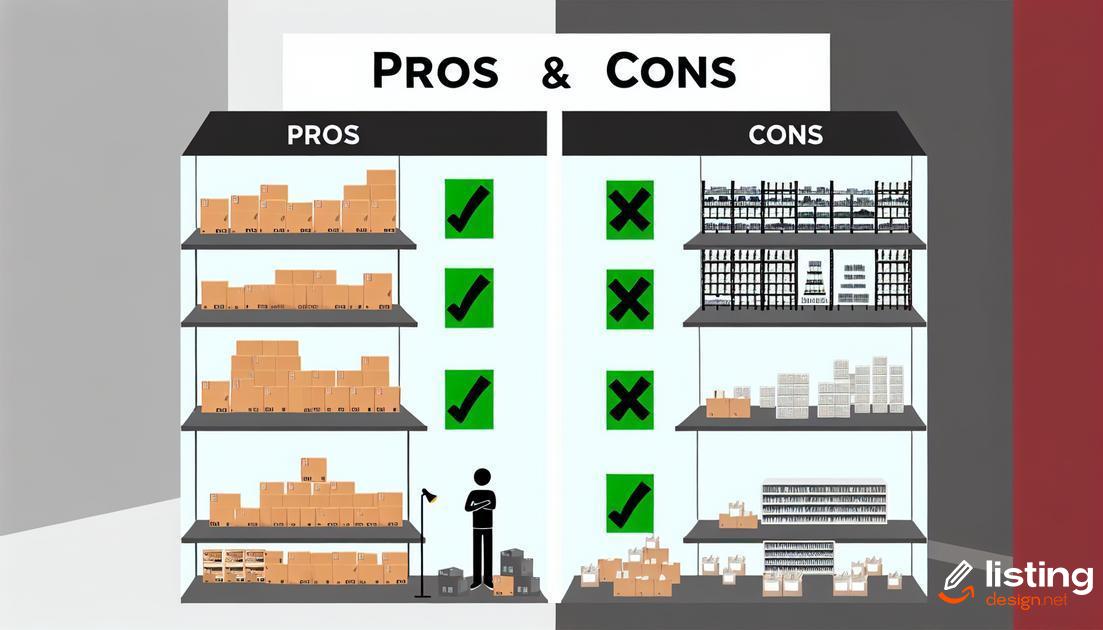
Pros of Wholesale
- Lower Upfront Costs: Wholesale often requires less capital compared to private label. This makes it accessible for new sellers.
- Established Brand Recognition: Selling well-known brands can make it easier to build trust with customers and generate sales quickly.
- Simplified Supply Chain: With wholesale, you don’t need to worry about manufacturing products. You source goods from brands or distributors and sell them directly.
- Less Time-Consuming: As you’re not developing a new product, the time to market is significantly reduced.
- Risk Mitigation: Selling known brands generally entails lower risk compared to creating a new product.
Cons of Wholesale
- Lower Profit Margins: Wholesale margins can be tighter since you’re reselling products, leaving less room for price adjustments.
- High Competition: Multiple sellers can offer the same products, leading to price wars and reduced profits.
- Lack of Product Differentiation: Unlike private labeling, you cannot customize or differentiate products, making it harder to stand out.
- Limited Control Over Inventory: You are dependent on the supplier’s inventory levels and might face stockouts or delays.
- Brand Restrictions: Some brands have strict guidelines on who can sell their products, limiting your opportunities.
Pros and Cons of Private Label
Pros
One of the main advantages of private label is the ability to create a unique brand. This helps in differentiating your products from those of competitors and can lead to higher profit margins. Furthermore, private label allows for complete control over product specifications, packaging, and branding, making it easier to meet customer needs and build brand loyalty.
Another significant pro is the flexibility in pricing. Since you are not competing directly with other sellers on the same product, you have the liberty to set prices based on perceived value. Additionally, private label products often experience lower competition on platforms like Amazon, making it easier to rank higher and achieve better sales velocity.
Cons
On the flip side, private label involves a higher upfront investment compared to wholesale. This includes costs for product development, branding, packaging, and marketing. Moreover, the process of developing and launching a private label product can be time-consuming, requiring extensive research, product testing, and supplier negotiations.
There’s also the risk of unsold inventory. Since private label products are unique, it’s not easy to return or liquidate excess stock. Additionally, managing a private label brand demands ongoing efforts in marketing and customer service to maintain a strong brand presence and customer satisfaction.
Cost Comparison: Wholesale vs Private Label
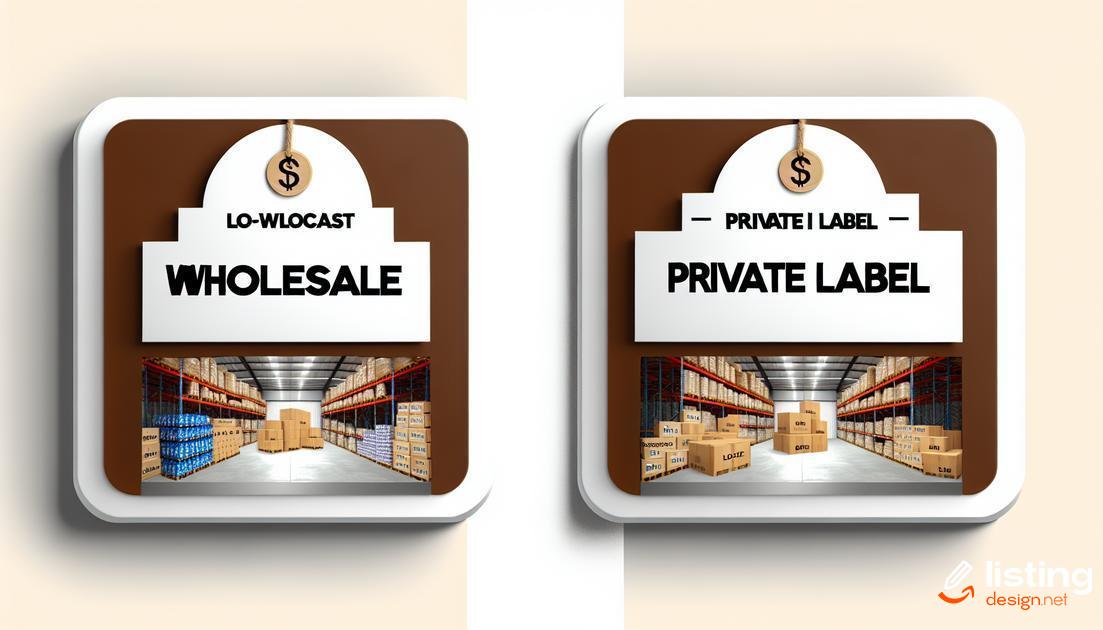
Cost Structure of Wholesale
- Initial Investment: Lower compared to private label since you’re purchasing pre-made products.
- Product Cost: Bulk purchasing often results in lower per unit costs.
- Labeling and Packaging: Minimal as it generally involves shipping pre-packaged products.
- Storage Fees: Varies based on the volume of goods delivered to Amazon FBA warehouses.
- Marketing and Advertising: Lower dependency on creating brand awareness; products already have market demand.
Cost Structure of Private Label
- Initial Investment: Higher due to the need for product development and branding.
- Product Cost: Usually higher per unit because you’re manufacturing customized goods.
- Labeling and Packaging: Significant costs involved in creating custom labels and packaging.
- Storage Fees: Similar to wholesale, but can vary based on the product size and volume.
- Marketing and Advertising: Higher expenses since you need to create brand awareness and demand.
Cost Comparison Summary
- Initial Investment: Wholesale requires a lower initial investment.
- Ongoing Expenses: Private label has higher ongoing costs due to continuous marketing and product differentiation efforts.
- Profit Margins: While private label has higher upfront costs, it often allows for higher profit margins due to brand control and product pricing flexibility.
Risks Involved in Wholesale
When diving into the world of wholesale, there are several risks you need to be aware of. Market Saturation: One of the biggest challenges is market saturation. Since you are buying products that are already established, you might find a lot of competition selling the same items. This can lead to price wars and reduced profit margins.
Dependency on Suppliers: Another risk involves your dependency on suppliers. If a supplier fails to deliver on time, provides faulty goods, or raises prices, your business could suffer significantly. Quality Control: Ensuring the quality of the products can also be tricky. Since you are not manufacturing the products yourself, you rely on the manufacturers to maintain high standards. Poor quality can lead to negative reviews and returns.
Inventory Management: Managing large inventories can be challenging. Overstocking can tie up your capital, while understocking can result in missed sales opportunities. Regulatory Compliance: You must also be aware of and comply with various regulations, which can vary by region and product type. Failure to comply can result in legal issues, fines, or business shutdowns.
Risks Involved in Private Label
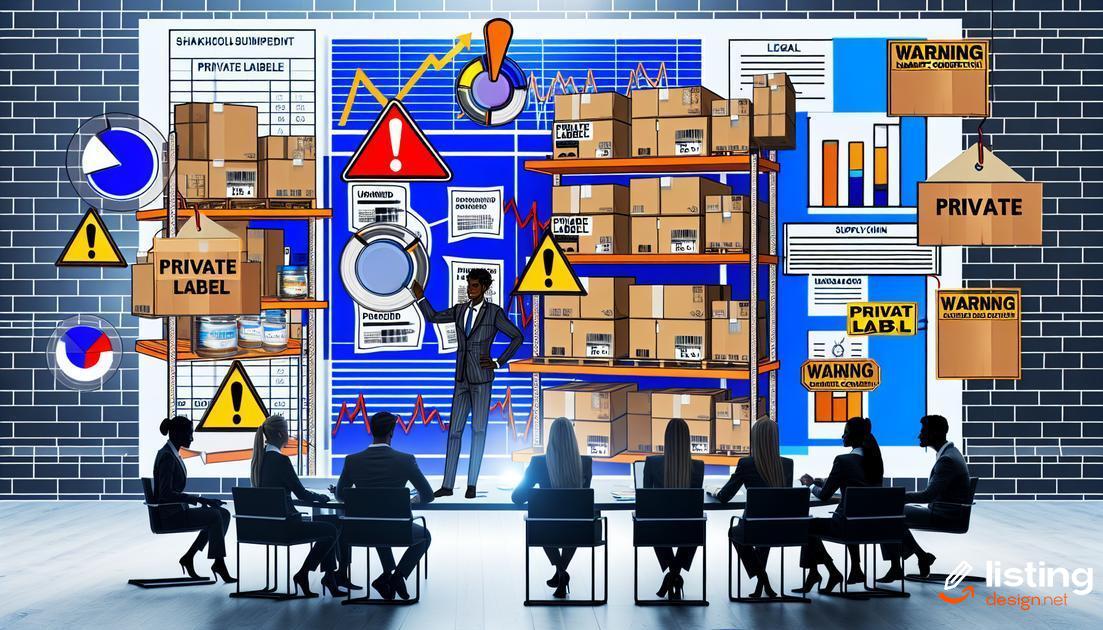
Choosing the private label route in your Amazon FBA journey can be lucrative, but it comes with its own set of challenges.
Financial Risk
Investing in a private label product involves significant financial commitment. From product development to inventory purchases, the upfront costs can be substantial. A miscalculation in market demand could result in excess stock that might not sell.
Competition
Creating a unique product does not necessarily eliminate competition. Established brands and copycats can quickly enter the market, making it challenging to maintain a significant market share. Continuous marketing and product differentiation are crucial.
Quality Control
Ensuring product quality can be a hassle, especially if sourcing from international manufacturers. Poor quality control can lead to negative reviews, which are detrimental to your product’s reputation on Amazon.
Intellectual Property Issues
Intellectual property theft is a common issue in the private label space. Protecting your brand and products from counterfeiters requires legal measures and vigilant monitoring.
Compliance and Regulation
Private label sellers must navigate various compliance and regulatory requirements, which vary by product category and region. Non-compliance can result in penalties or listing removal by Amazon.
Supply Chain Dependencies
Reliance on third-party manufacturers and suppliers introduces risks related to delays, quality inconsistencies, and even political or economic instability in suppliers’ countries.
Time Investment for Each Model
When it comes to time investment in Amazon FBA, both wholesale and private label models carry their unique challenges and time requirements.
Wholesale Model
The wholesale model involves finding and connecting with suppliers, negotiating terms, and managing inventory levels. This can be time-consuming initially as you establish relationships and set up processes. However, once established, reordering and inventory management tend to be more straightforward and less time-intensive.
- Initial Setup: Moderate to high time investment.
- Ongoing Management: Low to moderate time investment once processes are in place.
Private Label Model
The private label model, on the other hand, requires extensive time upfront to research products, develop branding, and manage production. Finding a reliable manufacturer and overseeing the creation of your unique product can be lengthy. Additionally, the process of creating listings and marketing your product requires continuous effort.
- Initial Setup: High time investment, including product research, branding, and production.
- Ongoing Management: Moderate to high, especially to sustain marketing efforts and manage customer feedback.
Summary: While the wholesale model may offer a quicker path to market, the private label model requires significant time commitment initially but can result in a uniquely branded product that can potentially yield higher long-term rewards.
Which Model Offers Better Profit Margins?

When evaluating profit margins, there are several factors to consider for both Amazon FBA Wholesale and Private Label models. Wholesale typically involves lower upfront costs as you are purchasing established branded products in bulk from manufacturers or distributors. This can result in narrower profit margins due to competitive pricing and lower control over pricing strategies.
In contrast, the Private Label model allows for higher profit margins as it gives sellers the ability to create and brand their own products. By controlling the production, marketing, and pricing, sellers can achieve higher markups. However, this requires a significant investment in product development, branding, and marketing to ensure the product stands out in the marketplace.
Additionally, Private Label sellers can leverage unique selling propositions and differentiate their products, allowing for premium pricing. On the other hand, Wholesale sellers may face price wars and reduced margins due to direct competition with other sellers offering the same product.
Ultimately, the potential for better profit margins in the Private Label model is balanced by the increased initial investment and effort required to establish the brand. Meanwhile, the Wholesale model, with its lower startup costs, might result in faster initial sales but generally provides thinner margins per unit sold.
Scalability: Wholesale vs Private Label
Scalability in FBA Models
When comparing scalability between wholesale and private label models in Amazon FBA, several factors need to be considered. Both business models can offer scalability, but the pathways and challenges differ significantly.
Wholesale: This model allows for rapid scaling primarily because you can purchase products in bulk from established brands. The main advantage here is leveraging the brand’s existing market presence, allowing faster listing and sales velocity. However, scaling through wholesale depends heavily on maintaining relationships with suppliers and ensuring a steady supply of high-demand products.
Private Label: Conversely, scaling a private label business can present more challenges but potentially greater rewards. This model requires more effort in the initial stages, such as product development, branding, and marketing. Once these elements are in place, a private label business can achieve significant scalability by expanding product lines and leveraging brand loyalty. The potential for larger profit margins and reduced competition can also support long-term scalability.
It is crucial to weigh these factors carefully when deciding on the best model to scale your Amazon FBA business effectively.
Final Verdict: Which Model to Choose?

After examining the essential aspects of Amazon FBA wholesale and private label, it’s clear that each model offers unique advantages suitable for different business goals. Wholesale typically involves dealing with established brands, making it easier to sell products with a proven track record. This approach minimizes marketing efforts and leverages existing brand recognition. On the other hand, private label provides an opportunity to create a unique product under your brand. This model allows control over product specifications, packaging, and branding, leading to potentially higher profit margins and customer loyalty.
Consider your long-term goals and resources when choosing between these models. Wholesale may be less time-consuming and easier to scale in the short term, but private label offers a chance to build a distinctive brand with greater control over the supply chain. Assess factors such as upfront costs, time investment, and risk tolerance to make an informed decision.
Which model aligns better with your business strategy and capabilities? If you prefer launching products quickly and capitalizing on existing market demand, wholesale could be more suitable. Conversely, if you aim to establish a unique brand presence and are willing to invest time and resources into product development, private label could be the better route.

